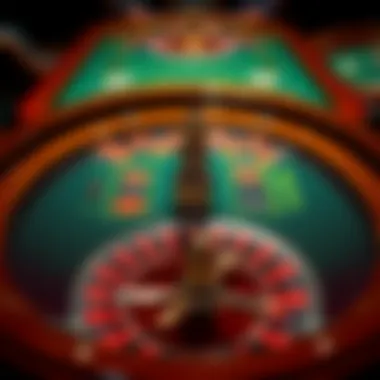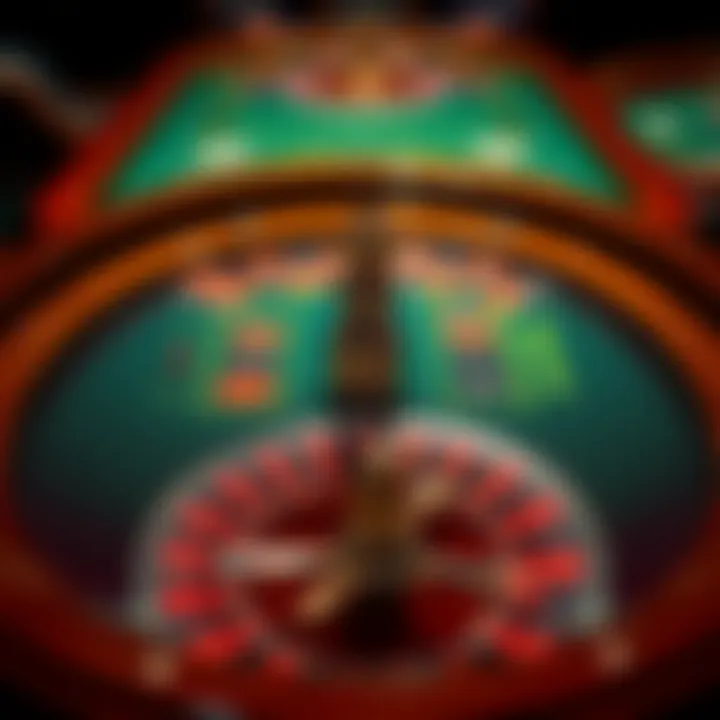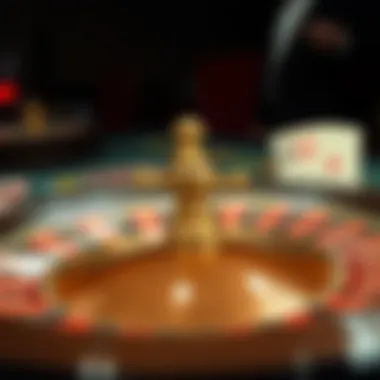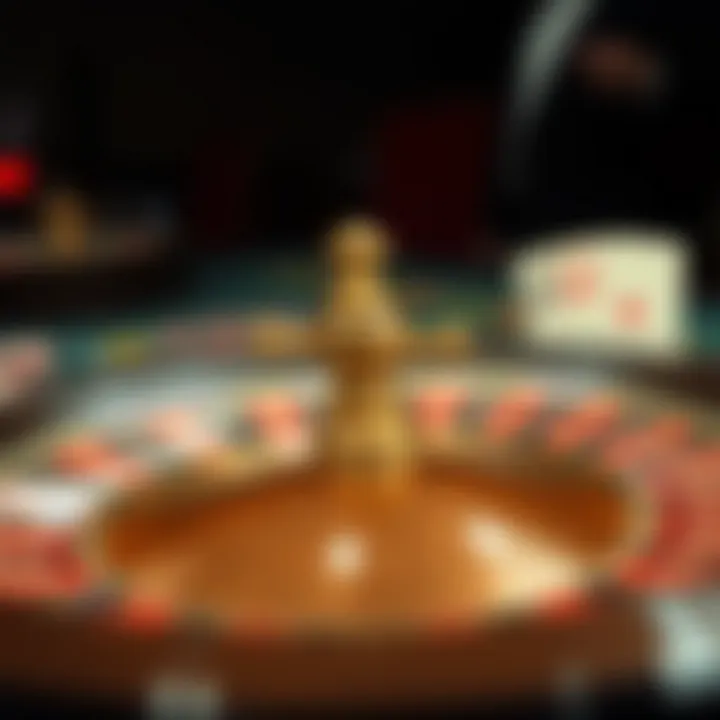Mastering Roulette: Strategies for Best Odds


Intro
Roulette, a game of chance that has captivated players for centuries, is often seen as a blend of luck and strategy. With spinning wheels and bouncing balls, it holds an irresistible charm and lures many into the vibrant atmosphere of casinos. Understanding the odds in roulette is not just about luck; it’s about grasping the mechanics and applying strategic insights to improve one's chances. This journey through the realm of roulette will shed light on the underlying principles that govern the game, empowering players to make informed choices.
When discussing roulette, it is crucial to differentiate between the various formats available. American, European, and French roulette each present unique characteristics that influence the odds and player strategies. For instance, the American wheel has an extra 00 slot, giving the house a larger edge compared to the other two formats. Additionally, different betting systems, such as Martingale or Fibonacci, can be applied to manipulate one’s approach.
Yet, it’s insufficient to merely grasp the odds; players must also understand the psychological aspects tied to gambling. The seductive nature of casinos, with their alluring designs and flashing lights, can impact decision-making. It’s possible for players to chase losses or develop unrealistic expectations, often ignoring the inherent house advantage.
As we delve deeper, we will highlight strategies and insights, while also drawing attention to the importance of responsible gaming. Engaging with roulette should never extend beyond one’s financial means or well-being and finding that balance is essential.
Throughout this article, we will explore the intricate facets of roulette, ensuring that readers not only gain knowledge but also are equipped with practical tips to enhance their gameplay.
The Essence of Roulette
Roulette is more than just a game of chance; it embodies a rich tapestry of history, strategy, and human behavior. Understanding the essence of roulette is crucial for anyone looking to maximize their gaming experience, especially in terms of odds. The game’s inherent randomness alongside its structure creates a unique environment where both luck and skill can play a significant role. This section aims to unravel the foundational aspects of roulette, providing insights that can influence a player’s decision-making during gameplay.
The very nature of roulette captivates players, drawing them into a world where a small ball deciding its fate can evoke intense emotions. The thrill of the spin, the clatter of the wheel, and the anticipation before the results are part of what makes roulette so enchanting. Players, whether seasoned or newbies, need to understand not just how to play but also the underlying principles that govern the game to make the most of their odds.
- Game Dynamics: At its core, roulette is driven by chance. The random nature of the game means that every spin presents a unique set of possibilities.
- Risk and Reward: Understanding the balance between high-risk bets and safer wagers is critical. Players can tailor their approaches based on their risk tolerance, whether seeking quick returns or a more cautious method of play.
- Social Interaction: It’s also worth noting the social environment roulette fosters. The collective experience of watching the ball bounce around the wheel creates a communal atmosphere, which can impact a player's psychology during the game.
Ultimately, grasping these fundamental aspects of roulette—its history, evolution, and dynamic nature—serves as the cornerstone for achieving a better understanding of odds and how to navigate the game effectively.
A Brief History of Roulette
Roulette has its origins deeply rooted in Europe, with various tales tracing back its beginnings to the late 18th century. While some elements are often shrouded in mystery, what remains clear is that the game has evolved significantly over time, leading to its current form. The earliest iterations likely stemmed from similar games played in ancient Rome and the Middle Ages. The modern version, however, was developed in France, where “roulette,” meaning "little wheel," became popular in gambling houses.
As the game made its way across borders, it adapted, incorporating various rules and designs. For instance, the introduction of the American roulette—with its double zero—offered distinct odds compared to the traditional European variant. This historical trajectory not only illustrates the game's appeal but also reflects how social and cultural subsets affect gambling practices.
Evolution of the Game
The transformation of roulette from a French pastime to a worldwide phenomenon is nothing short of fascinating. In the early 19th century, roulette was primarily played in elite circles, but as casinos began to sprout in Europe and the Americas, its accessibility increased. Innovations such as the American double zero and the invention of air-cushioned wheels changed the gameplay, attracting a broader audience.
The digital age has further revolutionized roulette, paving the way for online platforms to emerge. This allowed players to indulge in their favorite game from the comfort of their homes—a development that would have been unimaginable just a few decades ago. The online landscape also introduced live roulette, where players can engage with croupiers in real-time, preserving the social aspect of the game.
Today, roulette exists in various forms and continues to evolve with technological advancements. From classic brick-and-mortar establishments to sophisticated online casinos, the essence of roulette remains intact while adapting to contemporary trends. The interplay of chance, history, and innovation suggests that roulette will remain a coveted choice among gamblers for years to come.
Understanding the Game Structure
Understanding the game structure of roulette is crucial for players who aspire to enhance their betting strategies and maximize their odds. A solid grasp of how the game is built—from the mechanics of the roulette wheel to the types of bets available—arms players with the knowledge needed to make informed decisions at the table. Knowing the layout, rules, and types of bets will not only streamline the playing experience but also can significantly influence the outcomes and the player’s overall success.
The beauty of roulette lies in its seemingly simple rules balanced by its intricate design. Once a player comprehends the game structure, they are better positioned to enjoy the experience and perhaps even tilt the odds slightly in their favor. The next sections will delve deeper into the specifics of roulette's design and components, offering insights that can lead to more strategic gameplay.
Roulette Wheel Design
The roulette wheel is the heart of the game, essential for determining the outcome of each spin. A standard roulette wheel consists of 37 pockets in European styles, numbered from 0 to 36, while the American version includes an additional 00, totaling 38 pockets. Each pocket is colored either red, black, or green, the latter being reserved for the zero pockets.
This differentiation in pocket numbers is vital because it directly impacts the house edge. The single zero in the European wheel offers a lower house edge of about 2.7%. In contrast, the American wheel's double zeros bump it up to around 5.26%. By choosing the European wheel, players can make their money last longer with better odds against the house.
Another aspect to consider is the arrangement of numbers on the wheel, which follows a specific sequence designed to create a more thrilling gaming experience. The numbers are not placed in a sequential order, thereby improving the randomness of the outcomes.
Types of Roulette: European vs. American
When stepping into a casino or online platform, players will primarily encounter two types of roulette: European and American. Each variant comes with its unique rules and structures:
- European Roulette: This version features a single 0 and provides a lower house edge. Additionally, many players appreciate the"La Partage" rule, which allows them to reclaim half of their even-money bets if the ball lands on zero, further reducing their potential losses.
- American Roulette: As mentioned earlier, this kind includes both a 0 and a 00. The presence of the double zero raises the house edge, making it less favorable for players. However, it is worth noting that some American casinos might offer rules like “Surrender” which, similar to La Partage, can lessen the blow of a zero outcome.
Understanding these key differences helps players make strategic decisions when selecting which type of roulette to play. For instance, opting for European over American roulette can intuitively improve one's chances of winning.
Inside and Outside Bets Explained
Next, we move on to the types of bets players can place, categorized as inside and outside bets. Each comes with different odds and payout structures:
- Inside Bets: These involve wagering on specific numbers or small groups of numbers. They are often riskier but offer higher payouts. Examples include:
- Outside Bets: These are broader bets that cover entire categories. They include:
- Straight Up: Bet on a single number.
- Split Bet: Bet on two adjacent numbers.
- Street Bet: Bet on three numbers in a row.
- Red or Black: Betting on the color of the number.
- Odd or Even: Wagering whether the winning number will be odd or even.
- Dozens or Columns: Betting on groups of numbers, which covers a larger portion of the wheel.


Understanding the difference between inside and outside bets is strategic, as outside bets carry lower risk but also lower payouts. Meanwhile, an inside bet may become an attractive option for players looking for a quick win, albeit with the risk of greater losses.
Going into a roulette game with knowledge of the wheel's design, the variations in play, and the bet types puts players in a strong position to make smart choices that can increase their chances of success at the table.
Mathematics of Roulette Odds
Understanding the mathematical principles behind roulette is crucial for any player aiming to navigate the game effectively. The odds and probabilities are the backbone of how roulette operates, influencing both player strategies and outcomes. At the heart of this lies the concept of probability, which quantifies the likelihood of a specific outcome occurring. By grasping these odds, players can make more informed decisions, ultimately increasing their chances of a favorable result.
Probability in Roulette
When stepping up to the roulette wheel, players are essentially betting on chances. The probability of landing on a specific number is not merely luck; it's grounded in mathematics. In European roulette, there are 37 possible outcomes (numbers 1-36 plus a single zero), whereas American roulette bumps that up to 38 with the addition of a double zero. This fundamental difference impacts the odds significantly.
For instance, the probability of hitting a specific number in European roulette is roughly 2.7% (1 in 37), contrasting sharply with the 2.63% in American roulette (1 in 38). A better understanding of these probabilities helps players decide which table to choose based on the odds.available.
Knowing the odds is half the battle; mastering them is what gives you the edge.
Key Points on Probability in Roulette:
- Number of Outcomes: Calculate probabilities based on the total number of outcomes.
- House Advantage: Understand how the house edge skews probabilities.
- Types of Bets: Recognize that the odds vary across inside and outside bets at the table.
House Edge: A Critical Overview
Every casino, roulette or otherwise, has a built-in house edge designed to ensure profitability over time. The house edge is expressed as a percentage and indicates how much a player is likely to lose over time based on the total stakes they wager. In European roulette, the house edge is approximately 2.7%, while American roulette holds about 5.26% due to that pesky extra zero.
Importance of the House Edge:
- Long-Term Play: The house edge assures that, on average, over time, the casino will profit, despite short-term player wins.
- Effect on Betting Strategies: Understanding how the house edge impacts gameplay can influence the approach players take regarding betting systems.
- Realistic Expectations: Recognizing the house edge helps players set realistic expectations regarding their losses.
Comparing Odds Across Bet Types
Roulette offers a mix of betting options that come with different odds and payouts, providing unique opportunities for players. Inside bets, such as betting directly on a number, carry higher payouts but also lower probabilities of winning. In contrast, outside bets, like red or black, offer better chances of winning but at lower payouts.
Types of Bets and Their Odds:
- Inside Bets:
- Outside Bets:
- Straight Up: Bet on a single number — 35 to 1 payout, lower probability.
- Split: Bet on two adjacent numbers — 17 to 1 payout, higher probability than straight up.
- Red/Black: Bet on color (18 out of 37 or 38) — even money payout.
- Even/Odd: Bet on even or odd numbers — even money payout.
Understanding these distinctions is vital for a player’s strategy. Players should weigh their willingness to risk against the potential rewards when determining where to place their bets. By analyzing the odds from a mathematical perspective, they can boost their confidence and enhance their gameplay strategies.
Exploring Betting Systems
When it comes to roulette, understanding betting systems is crucial for players who want to enhance their chances of winning. Betting systems are frameworks that dictate how players should stake their money based on previous outcomes or specific patterns. While none of these systems guarantee success, they provide a structured approach to wagering that can help manage bankrolls and set expectations.
The importance of exploring betting systems lies in their potential to inform decision-making in the face of uncertainty. By using a systematic approach, one can mitigate the emotional turmoil that often comes with gambling. Additionally, these systems allow players to experiment with various strategies, leading to a deeper understanding of the game and its dynamics. However, it's critical to consider that while some strategies might work better than others, they can never change the inherent house edge present in roulette.
Martingale Strategy
The Martingale Strategy is probably the most famous betting system among gamblers. It operates on the premise of doubling your bet after each loss. The idea is simple: when you finally win, you will recover all previous losses plus win a profit equal to your original stake. For example, if a player starts with a $10 bet and loses, the next bet would be $20, then $40 if the second bet also lost, and so forth.
Example of the Martingale in Action:
- Bet: $10, Outcome: Loss
- Bet: $20, Outcome: Loss
- Bet: $40, Outcome: Win
- Profit: $10 (original stake)
While this strategy can lead to quick wins, it has a glaring flaw: a player can quickly run out of funds or hit the table limit before recovering losses. Thus, it's vital to employ this method with caution and to realize that it's designed for short spurts rather than long-term play.
Fibonacci Betting System
The Fibonacci Betting System offers a less aggressive method compared to Martingale. Based on the famous Fibonacci Sequence (1, 1, 2, 3, 5, 8), this system suggests increasing bets according to the sequence after each loss and returning to the start after a win. This approach is often seen as less risky and allows players to recover losses in a more measured way.
Example of the Fibonacci Sequence Applied:
- Bet: $10 (Fibonacci Number 1), Outcome: Loss
- Bet: $10 (Fibonacci Number 1), Outcome: Loss
- Bet: $20 (Fibonacci Number 2), Outcome: Win
- Return to Bet: $10 (Fibonacci Number 1)
The beauty of the Fibonacci System is grounded in its mathematical underpinning. Nevertheless, just like any other system, it doesn’t eliminate the house edge, and longer losing streaks can still cause significant financial strain. It's an option worth considering for those who prefer a calculated path over reckless gambling.


'Alembert System: Pros and Cons
The D'Alembert System is another popular betting strategy that focuses on a more balanced approach. Players start with a base bet and adjust the betting amount based on the outcomes, increasing the bet after a loss and decreasing it after a win. For instance, a player might start betting $10; after a loss, they increase to $20, and after a win, they revert to $10.
Pros of 'Alembert:
- Reduces potential risk by not doubling bets excessively, unlike Martingale.
- Allows players to manage their bankroll more effectively.
Cons of 'Alembert:
- Like other systems, it does not change the odds or the house edge.
- Extended losing streaks can still be detrimental.
In essence, every betting system has its advantages and disadvantages. What may work well for one player may not be as effective for another. Understanding these systems, their mechanics, and implications on betting behavior will help players make more informed decisions as they engage in roulette.
Remember, while systems provide structure, they don’t alter the nature of the game. Gamble responsibly and understand your limits.
For more information on gambling strategies and odds, check out resources like Britannica and Wikipedia for a deeper insight into the nuances of roulette.
Psychology of Gambling
The psychology of gambling plays a pivotal role in understanding the dynamics behind games like roulette. It’s more than just luck or strategy; it encompasses how players think, feel, and behave. This section dives into the nuances of player mentality and how it intertwines with the excitement of betting. Recognizing these aspects can arm gamblers with the insights needed to approach roulette with a clearer head and an enhanced strategy.
One significant element is understanding player motivation. Many gamblers are driven by the thrill of winning, while others seek social connectivity or even an escape from reality. The emotional highs and lows tied to roulette can be intense. Some players get so caught up in the adrenaline rush that they lose sight of the odds at play. Realizing what drives your own decisions can help manage expectations and approach the game with a balanced mindset.
Understanding Player Behavior
It's crucial to dissect how gambling habits shape player behavior at the roulette table. Each individual's reaction to wins and losses can drastically vary.
- Emotional Responses: Winning can trigger excitement, while losing may evoke a sense of despair. This emotional rollercoaster often leads to what is known as the gambler’s fallacy—the belief that past events affect future outcomes. If a player sees black come up multiple times, they might bet on red, thinking it's due for a win. However, with independent outcomes like in roulette, this line of thought is misleading.
- Binge Betting: Some players may resort to binge betting after a loss, hoping to quickly regain their lost funds. This often leads to further losses, creating a cycle that can be hard to break.
- Social Influences: The atmosphere of a casino can also impact behavior. Players surrounded by others who are winning might feel compelled to change their strategies based on the crowd, sometimes leading to poor decisions influenced by the group's energy.
Putting into practice an understanding of these behaviors can yield more sensible betting choices. Tracking personal emotions or keeping a betting journal might help mitigate erratic behaviors.
The Role of Risk and Reward
The delicate balance of risk and reward in gambling is another psychological aspect that can dictate player success. Every bet at the roulette table carries a certain level of risk, and it's this gamble that fuels both the exhilaration and the hazard of the game.
- Risk Tolerance: Every player has a different risk threshold. High-risk players may chase large payouts with aggressive bets, while conservative players often stick to safer bets with lower payouts. If someone has a high-risk tolerance, they might bet on high variance numbers only to suffer greater financial losses in the long haul.
- Reward Dissonance: It's typical for players to feel reward dissonance when heavy losses occur after several wins. This often leads to chasing losses, risking even more in an attempt to regain lost funds—a classic pitfall of gambling.
- Psychological Tricks: Casinos are adept at creating an environment that enhances the thrill of winning. The ringing of bells, bright lights, and aggressive marketing strategies all play into this, often skewing players’ perception of risk.
"In the world of gambling, where risk is inextricably tied to reward, maintaining a clear and rational mindset is essential to not just playing, but thriving.”
In closing, a grasp on the psychology behind gambling serves as a powerful tool. By understanding personal behaviors, motivations, and the sway of risk versus reward, players can make more informed choices at the roulette table. Knowing one’s own psychology can substantially shift gambling from mere chance to a more strategic pursuit.
For more insights on gambling and responsible strategies, you may check out additional resources at Wikipedia or Britannica.
As you navigate your roulette journey, keep these psychological elements in mind. They could make a world of difference in how you approach your games.
Practical Tips for Maximizing Odds
When it comes to roulette, knowing how to maximize your odds is about more than just luck; it's about strategy, awareness, and a little bit of intuition. The art of playing roulette effectively hinges on understanding not just the game itself but also how to position yourself for the best possible outcomes. A few well-chosen strategies can make a world of difference, changing a lackluster evening into something more profitable. This section delves into practical tips to help you navigate the thrilling yet unpredictable world of roulette.
Choosing the Right Table
Selecting the appropriate table is one foundational step that can greatly influence your chances of success. Different tables come with different rules, which can affect your odds significantly. Here are several factors to consider:
- Table Limits: Each table has minimum and maximum betting limits. Make sure to pick a table that aligns with your budget. It’s prudent to find a table where you’re comfortable placing bets without overextending your finances.
- American vs. European Roulette: If you want the best odds, opt for a European roulette table rather than an American one. The European version features a single zero, which gives players better odds compared to the American version’s double zero layout. Over time, this slight edge can have a substantial impact on your bankroll.
- Player Behavior: Observe the dynamics at the table. Some players may exhibit patterns or behaviors that can give you insight into how the game is flowing, while others might encourage caution.
- Presence of Other Players: Sometimes it’s better to simply look for a less crowded table. Fewer players mean less competition for the dealer and might allow for a more relaxed experience, giving you time to strategize your next move.
"Choosing the right table is like picking your battles; the right environment can tilt the odds in your favor."
Optimal Betting Strategies for Long-Term Play
When discussing optimal betting strategies, it’s essential to keep a long-term perspective in mind. Roulette isn't just a session of betting; it’s a game of endurance, where you want to stretch your bankroll as far as possible. Here are several strategies to consider:
- Flat Betting: This method involves betting a consistent amount on each round regardless of wins or losses. It minimizes your risk and allows you to play longer, giving you greater chances to hit that winning streak.
- Percentage of Bankroll Strategy: A prudent approach is to wager a certain percentage of your total bankroll on each bet. This encourages responsible betting and prevents you from draining your funds too quickly, especially during less favorable rounds.
- Combination Bets: Consider placing bets on multiple numbers at once. This can spread your risk and increase your chance of winning in each spin, although the payout may be reduced. Similarly, mix inside and outside bets to balance risk and reward.
- Setting Win and Loss Limits: Establish your own limits before you start playing. For instance, decide on a specific profit target to reach and a loss threshold you’re willing to accept. This not only provides structure to your play but prevents emotional decision-making.
In summary, navigating the game of roulette successfully involves more than mere chance. By choosing the right table and employing strategic betting methods, players can significantly improve their odds, ultimately enhancing their overall experience. To marry enjoyment of the game with the pursuit of profit, these practical tips can act as guiding principles as you spin the wheel.
The Impact of Technology on Roulette


In recent years, technology has become somewhat of a double-edged sword for casino games like roulette. It not only simplified the experience for many players but also introduced new dimensions to betting. Understanding how tech shapes the modern roulette experience is vital for anyone looking to maximize their odds and enjoy the game more. There’s a lot going on under the surface, from advancements in online platforms to the intricacies of game algorithms.
The Rise of Online Roulette
With the internet revolution, traditional casino experiences have transformed drastically. Online roulette platforms launched a whole new era for enthusiasts, making it possible to play the game without stepping foot in a physical casino. The convenience is undeniable. Imagine being able to play from your living room, at any time of day, with just a few clicks.
This accessibility has opened the gates for players of all skill levels. From newbies testing the waters with lower stakes to high rollers indulging in exclusive VIP tables, online roulette welcomes everyone. Additionally, many platforms now offer demos and free trials, helping players understand the odds and gameplay without financial risk.
However, there are caveats. The experience of spinning a real wheel and feeling the chips is hard to replicate digitally. Online environments can feel detached, and the speed of play can lead to rash decisions that might not happen in a brick-and-mortar casino.
Software and Random Number Generators
At the heart of every online roulette game lies software governed by Random Number Generators (RNGs). This technology ensures that every spin is fair and unpredictable, akin to a physical wheel. Essentially, these algorithms generate random outcomes that mimic the randomness of a real-life roulette table.
Here’s where things get interesting. Understanding RNGs is crucial for anyone serious about roulette. This technology not only affects the game but also plays a role in the overall odds. When you place a bet, the software processes it through RNGs to produce an outcome.
The integrity of RNG systems is monitored regularly by independent agencies to ensure fairness and transparency in online gaming.
- Benefits of RNGs:
- Considerations:
- Ensures fairness: No player can predict the future spins.
- Supports a variety of gameplay styles: Positions such as American and European roulette can be implemented easily.
- Players must choose reputable online casinos to guarantee they are engaging with certified RNG software.
- Misunderstandings about how RNGs function can lead to misconceptions about the odds.
To wrap it up, technology plays a pivotal role in reshaping our roulette experience. While online platforms and RNGs add layers of convenience and fairness, it is crucial to navigate these advancements with a discerning eye. Embracing technology doesn't just mean playing online; it also involves understanding how it influences the game you love.
Responsible Gaming Practices
Responsible gaming practices are crucial to ensuring a safe and enjoyable gambling experience, especially in a game like roulette, where the flurry of spinning wheels and bouncing balls can entice players into losing track of time and money. Understanding the importance of responsible gaming goes beyond just adhering to personal limits; it encompasses a holistic approach to gambling that promotes mental well-being and financial security.
Understanding Gambling Addiction
Gambling addiction can sneak up on the unsuspecting player, often starting with what seems like innocent entertainment. One moment, you're in control, enjoying the thrill of placing bets, and the next, it spirals into an uncontrollable compulsion. It’s crucial to be aware of the signs of gambling addiction, as they can manifest in various ways:
- Preoccupation with gambling: Constantly thinking about past wins or planning future bets can be a telltale sign.
- Loss of control: Repeated attempts to cut back on gambling without success often indicate a deeper issue.
- Chasing losses: Trying to recoup lost money can lead to even heavier losses and further compulsion to gamble.
- Neglecting responsibilities: If gambling begins to interfere with work, relationships, or personal responsibilities, it's time to reassess the situation.
To combat potential addiction, one must stay attuned to these signs and seek help if necessary. Resources like Gamblers Anonymous or counseling services can provide support for those in need. Recognizing gambling addiction as a serious issue can pave the way towards healthier gambling habits.
Establishing Personal Limits
Setting personal limits is an effective way to safeguard against the pitfalls of gambling. This could involve deciding beforehand how much time and money you’re willing to spend on roulette. Consider these strategies for establishing personal limits:
- Budgeting Your Play: Before stepping into a casino or logging into an online gaming site, determine a specific budget for your play. Stick to it, regardless of the temptations that arise during play.
- Time Limits: Set a timer to ensure you are not playing longer than you've intended. It’s easy to lose track of time in the heat of the moment.
- Avoiding Alcohol: Staying sober while gambling can help you maintain clarity and self-control.
- Self-Evaluation: Take regular breaks to assess whether you are still enjoying the game. If you’re not having fun, it may be time to walk away.
"Setting limits is the first step to ensuring that your experience with roulette is entertainment, not an obligation or burden."
Embracing responsible gaming practices not only helps in reducing the risks associated with gambling but also enhances the overall enjoyment of the game. By keeping a keen eye on the signs of addiction and establishing strict personal limits, players can savor every moment at the roulette table without losing their way. This balanced approach not only instills a sense of security but also fosters a healthier relationship with gambling in general.
For further support and information on responsible gambling, you can explore resources at National Council on Problem Gambling or Gamblers Anonymous while keeping your gaming journey enjoyable and secure.
Finale
In wrapping up our exploration of roulette, it's clear that understanding the game’s odds is paramount, not just for the thrill, but also for making wise decisions at the table. Roulette, with its spinning wheel and the anticipation of the ball landing, offers excitement that keeps players returning, but a solid grasp of the odds can transform a random game into a strategic endeavor.
Summarizing Key Takeaways
Several key points emerge from our discussion:
- Types of Roulette: Recognizing the differences between American and European roulette is crucial. The latter provides better odds due to the absence of a double zero.
- Bet Types and Payoffs: Inside bets typically yield higher payouts, yet come with greater risk. Outside bets, while safer, offer smaller returns. Balancing these strategies based on your risk tolerance is essential.
- Betting Systems: Understanding various betting systems, such as Martingale and Fibonacci, helps players manage their bankroll more efficiently. However, no system guarantees wins, thus caution is needed.
- House Edge: Always keep the house edge in mind. It's the casino's built-in profit margin, which varies between game types and should inform your expectations of winning.
- Responsible Gambling: Lastly, never lose sight of responsible gaming practices. Setting limits and understanding when to walk away can save you from pitfalls along the way.
The Future of Roulette: Trends and Predictions
Looking ahead, the future of roulette seems promising, with exciting trends developing in both technology and gameplay. Online roulette has grown exponentially, allowing players from all walks of life to engage in the game from the comfort of their homes. Enhanced graphics and virtual reality platforms are likely to enhance the immersive experience further.
Moreover, as artificial intelligence continues to evolve, we may see data-driven tools that could provide insights into betting patterns, helping players refine their strategies based on analyses of real-time data.
Casinos are also focusing on creating more engaging environments that blend online and physical gameplay. This hybrid approach could attract a wider range of participants, ensuring the game’s continued popularity.
In summary, while the world of roulette will continue to evolve, the fundamentals of understanding odds will remain critical. Staying informed about trends and improvements in technology, while keeping the house edge and responsible gaming practices in mind, is key to mastering this timeless game.
"Roulette is not just a game of chance; it's an art of managing possibilities, whether you are in a glamorous casino or playing online from your couch."
For further reading and insights into the strategies and future of roulette, consider visiting Wikipedia, Britannica, and discussions on platforms like Reddit.















